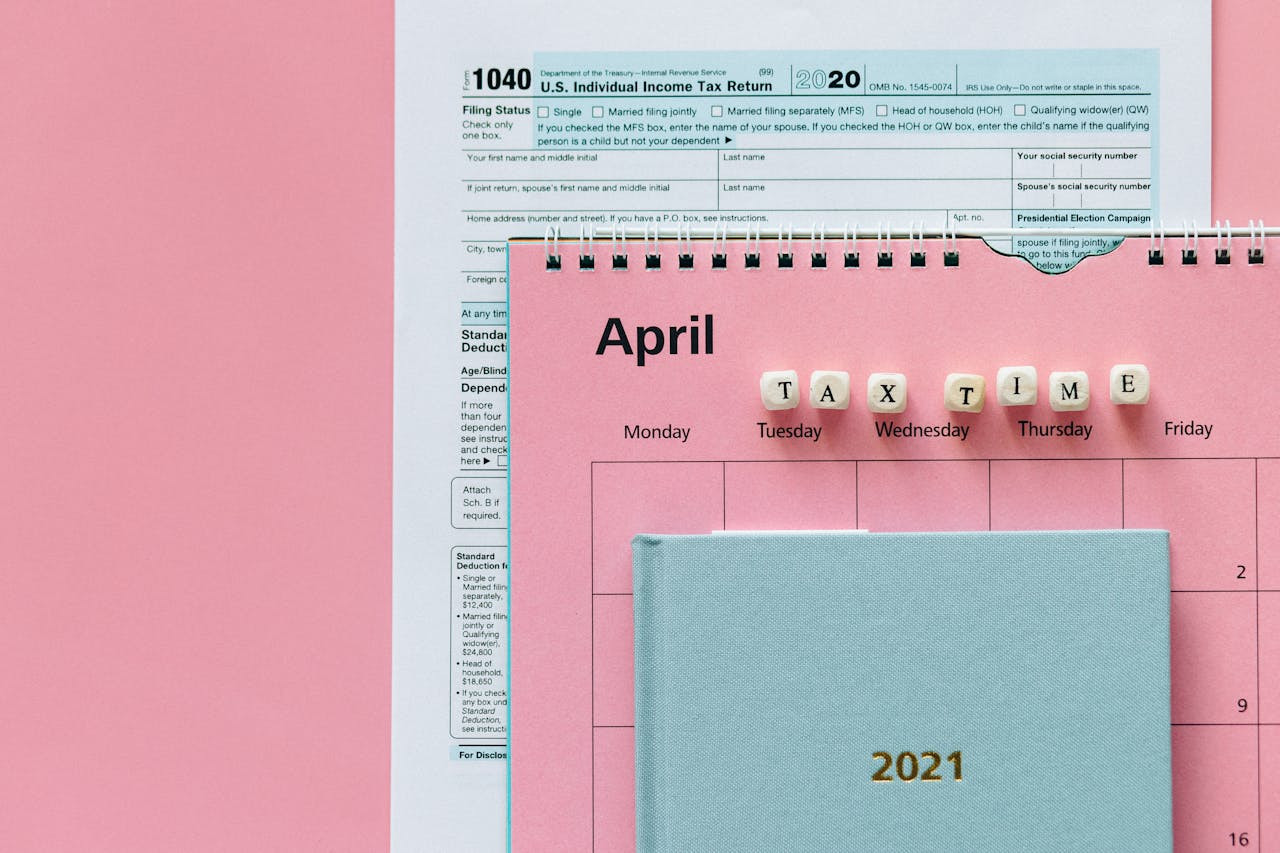8 Income Tax Return Filing Mistakes That Are Easy to Avoid

Income tax return filing can be a daunting task for many, filled with potential pitfalls and common mistakes. However, with some knowledge and preparation, most errors can be easily avoided. Here are eight such mistakes and provide practical advice on preventing them. Whether you're a seasoned filer or new to the process, this guide will help ensure your income tax return filing is smooth and error-free.
Table of Contents
Introduction
Incorrect Personal Information
Failing to Report All Income Sources
Ignoring Eligible Deductions and Credits
Math Errors and Calculation Mistakes
Choosing the Wrong Filing Status
Filing Late or Missing the Deadline
Not Keeping Copies of Tax Records
Handling IRS Notices and Audits Improperly
Frequently Asked Questions (FAQs)
Key Takeaways✔ Ensure accuracy in personal information to avoid delays and errors in tax processing. ✔ Include every source of income, no matter how small, to prevent IRS audits and penalties. ✔ Take advantage of eligible tax deductions and credits to reduce your overall tax liability. ✔ Use reliable tax software or professional help to prevent costly calculation mistakes in your return. ✔ Handle IRS communications carefully and seek professional advice to avoid further tax complications. |
1. Incorrect Personal Information
How Errors Occur and Their Consequences
The importance of correct personal information must be balanced. This includes your full legal name, Social Security Number (SSN), address, and, if applicable, information about your dependents. Errors in personal details often stem from simple oversights or outdated information. A misspelled name, transposed digits in an SSN, or an old address can lead to significant issues such as:
Delayed Processing: Incorrect information can flag your return for review, slowing the processing time.
Refund Issues: A mismatch in details can lead to delays or misdirected tax refunds.
Identity Verification Problems: The IRS uses your personal information to verify your identity. Discrepancies can raise red flags and potentially freeze your account until the issue is resolved.
Strategies to Ensure Accuracy
Ensuring the accuracy of your personal details in income tax return filing involves several proactive steps:
Double-Check Before Submission: Review your tax forms for typos or outdated information before filing.
Consistency with Social Security Administration (SSA) Records: Ensure that the name and SSN on your tax return exactly match those on your Social Security card.
Update Information Promptly: If you have recently changed your name (due to marriage or other reasons) or moved, update your details with the SSA and the IRS before filing.
Use Professional Help if Needed: If your tax situation is complex (e.g., involving dependents, name changes, etc.), consider seeking help from a tax professional to avoid errors.
2. Failing to Report All Income Sources
Spectrum of Income Sources
One of the more nuanced aspects of income tax return filing is accurately reporting and listing all sources of income. This includes your primary earnings from employment and other less obvious sources. These include freelance income, interest from savings accounts, dividends from investments, rental income, or even earnings from a hobby that turned profitable. The IRS requires taxpayers to report income from all these sources, and failure to do so can lead to audits and penalties.
Why It's Overlooked and the Resulting Impact
Taxpayers often need to pay more attention to additional income sources during income tax return filing due to a lack of understanding of taxable income or simply forgetfulness. For instance, a small side job or interest earned from a bank account might seem insignificant, but it's still reportable income. The consequences of omitting these sources can be significant:
Increased Scrutiny from the IRS: Discrepancies between reported income and IRS records can trigger an audit.
Penalties and Interest: Reporting only some income can lead to underpayment of taxes, which results in penalties and accruing interest.
How to Ensure Complete Income Reporting
To avoid this mistake in income tax return filing, consider the following strategies:
Maintain Comprehensive Records: Keep detailed records of all annual income, not just your primary salary.
Understand Taxable Income: Familiarize yourself with what the IRS considers taxable income. If in doubt, consult IRS publications or a tax professional.
Use Tax Software Wisely: Many modern tax software programs can help identify potential sources of income based on your financial history and previous year's return.
3. Ignoring Eligible Deductions and Credits
Why Deductions and Credits in Income Tax Return Filing Matter
With income tax return filing, deductions and credits can significantly lower your tax liability. Deductions reduce the amount of your taxable income, while credits directly reduce your tax bill. Many taxpayers miss out on these valuable benefits because they're unaware of them or because they find the rules governing deductions and credits complex and confusing.
Commonly Overlooked Deductions and Credits
There are several deductions and credits that taxpayers frequently overlook. These include:
Education Credits: These include the American Opportunity Credit or Lifetime Learning Credit, which can offset higher education costs.
Charitable Contributions: Including cash and non-cash donations to qualified charities.
Home Office Deduction: Applicable if you use a part of your home exclusively for business purposes.
Medical and Dental Expenses: You can deduct certain medical expenses that exceed a percentage of your adjusted gross income.
State and Local Taxes: The ability to deduct some state and local taxes paid throughout the year.
How to Identify and Claim Eligible Deductions
To effectively utilize deductions and credits in your income tax return filing, consider these steps:
Stay Informed: Tax laws change frequently, so staying updated on the latest deductions and credits is essential.
Keep Good Records: Maintain receipts, invoices, and other documents throughout the year to substantiate your claims.
Use Reliable Tax Software: Modern tax software can help identify potential deductions and credits based on your financial situation.

4. Math Errors and Calculation Mistakes
Why Mathematical Mistakes Should Be Avoided
One of the most frequent and easily avoidable errors in income tax return filing is mathematical inaccuracies. These mistakes range from simple addition and subtraction errors to complex calculation blunders involving deductions, credits, or income reporting. Even minor math errors can result in various consequences, from delayed refunds to incorrect tax liability assessments, triggering IRS inquiries or audits.
Common Calculation Errors
Math errors in income tax return filing often originate from:
Manual Calculations: Doing calculations by hand increases the risk of errors, especially with complex tax forms.
Misinterpretation of Tax Forms: Misunderstanding how to fill out certain sections can lead to incorrect entries.
Incorrectly Reported Income or Deductions: Entering the wrong figures for income or deductions can drastically alter tax calculations.
Tools and Techniques to Prevent Calculation Mistakes
To minimize math errors in your income tax return filing, consider these methods:
Use Reliable Tax Software: Tax software automatically performs calculations, reducing the likelihood of errors.
Double-Check Manual Entries: If entering data manually, review all numbers carefully, especially if transcribing from other documents.
Understand the Forms: Ensure you fully comprehend the tax forms and instructions to avoid misinterpretation.
Why Accuracy in Tax Calculations Matter
Accuracy in tax calculations is a cornerstone of error-free income tax return filing. By leveraging technology and being meticulous in data entry and form comprehension, taxpayers can significantly reduce the risk of costly mathematical mistakes.
5. Choosing the Wrong Filing Status
Why Filing Status Matter
The choice of filing status is a critical decision in the income tax return filing process, as it affects the amount of tax liability, the standard deduction amount, and eligibility for certain tax credits.
There are five filing statuses: Single, Married Filing, Jointly, Married Filing Separately, Head of Household, and Qualifying Widow(er) with Dependent Child. Selecting the incorrect filing status can lead to various tax issues, including an inaccurate tax liability calculation and missed tax savings opportunities.
Common Misconceptions and Errors in Choosing Filing Status
Taxpayers often make mistakes in selecting their filing status due to misconceptions or a lack of understanding of the specific criteria for each status. For instance, single parents might miss out on the Head of Household status benefits, or newly married couples might incorrectly file as Single. These errors can result in paying more tax than necessary or failing to qualify for key tax benefits.
Guidelines for Determining the Correct Filing Status
To correctly determine your filing status for income tax return filing, follow these guidelines:
Review IRS Criteria: Understand the criteria for each filing status outlined by the IRS.
Consider Marital Status: Your marital status on the last day of the year typically determines your filing status.
Evaluate Household Circumstances: Consider factors such as dependents and household costs for statuses like Head of Household.
Update Status for Life Changes: Changes like marriage, divorce, or the death of a spouse should prompt a reevaluation of your filing status.
Why Professional Advice in Selecting Filing Status Matters
Given the complexities and potential impact of choosing a filing status, seeking professional advice can be wise, especially for those with changing family situations. A tax professional can clarify and ensure that you make the most beneficial choice for your specific circumstances in your income tax return filing.
6. Filing Late or Missing the Deadline
Why Late Filing Should Be Avoided
Filing your income tax return after the deadline is a mistake that can have serious consequences. The IRS imposes penalties for late filing, which can accumulate over time. Additionally, late filers might miss out on receiving timely tax refunds, and consistent lateness can attract unwanted attention from the IRS.
Understanding Deadlines and Extensions
When it comes to income tax return filing, the typical deadline is April 15th of each year. However, if this date falls on a weekend or a holiday, the deadline is extended to the next business day. For those unable to meet the regular deadline, the IRS allows an extension to file, typically until October 15th. However, it's important to note that an extension to file is not an extension to pay any taxes owed.
Strategies for Timely Filing
To ensure timely income tax return filing, adopt these practices:
Start Early: Begin gathering tax documents as soon as they are available. Procrastination is a common cause of late filing.
Organize Tax Documents: Keep all your tax-related documents in one place. This includes W-2s, 1099s, receipts for deductions, etc.
Utilize Tax Software or Professionals: These resources can streamline the filing process and help you meet deadlines.
Set Reminders: Mark the filing deadline on your calendar and set periodic reminders as the date approaches.
Proactive Measures are Key in Income Tax Return Filing
Staying proactive, organized, and aware of deadlines is crucial in avoiding the pitfalls of late income tax return filing. Extensions are available but should be used judiciously, as they do not exempt you from paying owed taxes by the original deadline.

7. Not Keeping Copies of Tax Records
Why Record Keeping in Income Tax Return Filing Matters
Maintaining copies of your tax records is fundamental to responsible income tax return filing. These records include your filed tax returns and supporting documents like W-2s, 1099s, receipts, and other proofs of income and deductions. Proper record-keeping is crucial for several reasons: it aids in preparing future tax returns, supports items reported on your tax return in case of an IRS audit, and helps track the basis of property for calculating depreciation, amortization, or sale of property.
Best Practices for Tax Record Retention
To effectively manage your tax records for income tax return filing, adhere to these practices:
Duration of Record Keeping: As a general rule, keep your tax records for at least three years from the date you filed your original return or two years from the date you paid the tax, whichever is later. Keep records for seven years if you file a claim for a loss from worthless securities or bad debt deduction.
Organizing Records: Organize your records by year and type of income or expense. Utilize digital methods for better organization and easier access.
Regular Review and Update: Regularly review and update your records, especially after significant financial events like the sale of a property or a change in employment.
Leveraging Technology for Efficient Record-Keeping
Leveraging technology can significantly enhance the efficiency and accuracy of record keeping in income tax return filing. Numerous apps and software are designed to track expenses, store digital copies of receipts and documents, and organize records.
8. Handling IRS Notices and Audits Improperly
Common Missteps in Responding to the IRS
Taxpayers often need to understand the nature of the inquiry to respond to IRS notices or audits. Ignoring IRS communications is a grave mistake that can lead to enforced collection actions, including levies on your wages or bank accounts.
Best Practices for Handling IRS Communications
To correctly manage IRS notices and audits during your income tax return filing, consider the following steps:
Read and Understand the Notice: Carefully read the entire IRS notice to understand what is being asked or why you are being audited.
Respond Promptly and Accurately: A timely response to the IRS is crucial. Gather all necessary documents and information to provide a complete and accurate response.
Keep Record of Correspondences: Maintain copies of any correspondence with the IRS, including the notices you receive and the responses you send.

Frequently Asked Questions (FAQs)
What should I do if I realize I made a mistake on my filed tax return?
If you discover an error after submitting your tax return, the IRS recommends filing an amended return using Form 1040-X. This form allows you to correct mistakes like income, deductions, or credits. Addressing inaccuracies as soon as they're discovered is crucial, as this can prevent potential penalties and interest charges. Remember, the IRS often provides a window for amending returns, usually within three years from the date you filed the original return or within two years from the date you paid the tax, whichever is later.
Can I file my tax return electronically?
Yes, electronic filing (e-filing) is available and encouraged for most taxpayers. E-filing is typically faster, more secure, and more accurate than paper filing. The IRS receives electronically filed returns almost instantly, and refunds can be processed much quicker, especially if combined with direct deposit. Additionally, most e-filing tax software has built-in error-checking features, which can significantly reduce the likelihood of mistakes in your income tax return filing.
What are estimated tax payments, and who needs to make them?
Estimated tax payments are periodic prepayments of income tax that apply mainly to those with income not subject to withholding, such as self-employment earnings, rental income, investment income, and some forms of retirement income. Individuals, including sole proprietors, partners, and S corporation shareholders, usually must make estimated tax payments if they expect to owe $1,000 or more when their return is filed. These payments are typically made quarterly, and failing to make payments when due can result in underpayment penalties.
How do I know if I need to file a tax return?
The requirement to file a tax return largely depends on factors like your income, age, filing status, and the types of income you received during the year. For instance, you must file a return if your income is above a certain threshold (depending on age and filing status). Specific income types, such as self-employment income over $400, also require filing. The IRS provides detailed guidelines on their website, or you can consult a tax professional to determine your filing obligations.
What should I do if I can't pay my tax bill in full by the deadline?
If you cannot pay the total taxes you owe by the deadline, it's still important to file your return or request an extension to avoid a late filing penalty. After filing, you should contact the IRS to discuss available payment options. One common solution is to set up an installment agreement, where you pay your tax debt over time in smaller, manageable amounts.
Simplify Your Tax Season with Expert Help at Fincadia Tax Services
Ready to navigate the complexities of your tax returns with ease? Fincadia Tax Services in Ballston, NY, is here to assist you. Our team of experienced tax professionals is dedicated to providing personalized and efficient tax solutions tailored to your unique needs. Whether you're dealing with intricate tax situations or seeking to maximize your returns, we're here to help. Contact Fincadia Tax Services today for a consultation, and let's take the first step towards a stress-free tax season.
Call us now!
Want tax & accounting tips and insights?
Sign up for our newsletter.